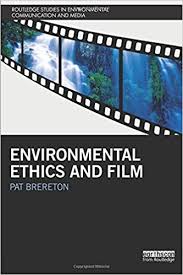Brereton, Pat - Environmental Ethics and Film, New York: Routledge, 2016, (pp. 256). ISBN – 978-0-415-74728-8
Reviewed by Hart Cohen - Western Sydney University
First published in 2016, Environmental Ethics and Film is a timely intervention in the debates around the Anthropocentric frame for critical perspectives on climate change. In the knowledge-culture-ecology matrix, this book hits the right targets – media (as cinema with eco-thematics around waste), indigeneity as it offers alternative onto-epistemologies, eco-feminism as it crosses eco-themes with science fiction genres, treatment of the animal and business worlds with attention to extinction and social equity mark out the main contours of the book. Grounded in an ethics argument, the sense of the moral suasion enacted by the book seeks a purchase on the anthropocentrically-driven understanding of humanity’s place on the spectrum of environmental impacts.
Film has been at the forefront of the engagement with environmental concerns, and especially with how to orient its audiences to the future. The close readings given to a number of mainstream Hollywood films in the book provide a good basis for re-thinking the role of Hollywood in this particular engagement. The specific interest in a non-apocalyptic message is an important step given the predominance of this approach in the relatively recent cinema. Brereton’s approach is that by grounding the argument in an environmental ethics frame, film can create more complex scenarios where dystopic outcomes may not necessarily be the go–to strategy to push an ecological agenda.
At a time when the planet faces climactic perils, crafting messages and narratives that are as complex as the problems themselves is crucial to the successful resolution of this crisis. This book goes some way to providing the basis for thinking how this could be possible.
Brereton writes: ‘…mainstream movies, as affirmed throughout this volume, are also valuable as artefacts for ‘seeing ecology’…’ (190). ‘Seeing’ ecology is an interesting idea when linked to the work of the imagination. It may signal a useful transformational approach towards the re-imagining of environmental contingencies whether related to climate change, species extinctions, and /or pollution.
The idea of the ecological has undergone massive revision and re-articulation involving disciplines and fields of research. There is a complexity and profound sense of urgency to rethinking these conceptual shifts. It demands that new approaches to time and space and to elaborate the ecological as an analytical force. This book does well to highlight ecological thinking and embed environmental ethics at the heart of its central thesis.
As a contribution to thinking about mediated contributions to representing and understanding planetary crisis, this book is predicated on an ethical commitment to film as a form of speculation. With media representations of ecological crises, there are emerging eco-media discourses. The examples in the book remind us of the potential of creative methods in artistic practices and how in this moment of social history, the need for artistic engagement in this field has never been greater.
About the reviewer
Hart Cohen is Professor in the School of Humanities and Communication Arts and a member of the Institute for Culture and Society.

